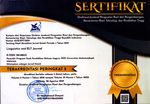Problem Based Learning to Improve Students’ Grammar Competence at Second Semester Students of English Education Borneo University Tarakan
Abstract
Keywords
Full Text:
PDFReferences
Ç. T. Mart, “Teaching grammar in context: Why and how?,” Theory Pract. Lang. Stud., vol. 3, no. 1, pp. 124–129, 2013, doi: 10.4304/tpls.3.1.124-129.
E. Tomakin, “Teaching English Tenses (grammar) in the Turkish Texts: A Case of Simple Present Tense: I maketi iter,” Int. J. Learn. Dev., vol. 4, no. 1, p. 115, 2014, doi: 10.5296/ijld.v4i1.5154.
T. S. R. Jack C. Richards, “Approaches and Methods in Language Teaching,” Approaches Methods Lang. Teach., 2015, doi: 10.59646/methodsengteach/108.
M. B. Etherington, “Investigative primary science: A problem-based learning approach,” Aust. J. Teach. Educ., vol. 36, no. 9, pp. 53–74, Jan. 2011, [Online]. Available: https://search.informit.org/doi/10.3316/ielapa.328484780726539
A. Keziah, “A comparative study of problem-based and lecture-based learning in secondary school students’ motivation to learn science,” Int. J. Sci. Technol. Educ. Res., vol. 1, no. 6, pp. 126–131, 2010, [Online]. Available: http://www.academicjournals.org/IJSTER
C. De Simone, “Problem-Based Learning in Teacher Education: Trajectories of Change,” Int. J. Humanit. Soc. Sci., vol. 4, no. 12, pp. 27–41, 2014, [Online].
N. Othman and M. I. A. Shah, “Problem-based learning in the English language classroom,” English Lang. Teach., vol. 6, no. 3, pp. 125–134, 2013, doi: 10.5539/elt.v6n3p125.
G. Dastgeer and M. Tanveer Afzal, “Improving English Writing Skill: A Case of Problem Based Learning,” Am. J. Educ. Res., vol. 3, no. 10, pp. 1315–1319, 2015, doi: 10.12691/education-3-10-17.
C. L. Chiang and H. Lee, “The Effect of Project-Based Learning on Learning Motivation and Problem-Solving Ability of Vocational High School Students,” Int. J. Inf. Educ. Technol., vol. 6, no. 9, pp. 709–712, 2016, doi: 10.7763/ijiet.2016.v6.779.
M. Nurtanto, M. Fawaid, and H. Sofyan, “Problem Based Learning (PBL) in Industry 4.0: Improving Learning Quality through Character-Based Literacy Learning and Life Career Skill (LL-LCS),” J. Phys. Conf. Ser., vol. 1573, no. 1, pp. 0–10, 2020, doi: 10.1088/1742-6596/1573/1/012006.
R. Ardianti, E. Sujarwanto, and E. Surahman, “Problem-based Learning: Apa dan Bagaimana,” Diffraction, vol. 3, no. 1, pp. 27–35, 2022, doi: 10.37058/diffraction.v3i1.4416.
E. Widiasworo, Strategi Pembelajaran Edutainment Berbasis Karakter, 1st ed. ar-Ruzz Media, 2018.
R. N. Stephen Kemmis,Robin McTaggart, The Action Research Planner. New York: Springer, 2014. doi: 10.1007/978-981-5460-67-2.
R. Bogdan and S. Biklen, Qualitative research for education: An introduction to theories and methods, Third. Pearson, 2007.
M. Zuhriyah, “Problem-Based Learning to Improve Students’ Grammar Competence,” Regist. J., vol. 10, no. 1, p. 48, 2017, doi: 10.18326/rgt.v10i1.875.
C. & M. F. Chotimah, Paradigma Baru Sistem Pembelajaran: Dari Teori, Metode, Model, Media, Hingga Evaluasi Pembelajaran, 1st ed. Yogyakarta: Ar-Ruzz Media, 2018.
DOI: https://doi.org/10.31764/leltj.v13i1.31618
Refbacks
- There are currently no refbacks.
Copyright (c) 2025 Fitriawati Fitriawati

This work is licensed under a Creative Commons Attribution-ShareAlike 4.0 International License.
_____________________________________________________
Linguistics and ELT Journal
p-ISSN 2339-2940 | e-ISSN 2614-8633

LELTJ is licensed under a Creative Commons Attribution-ShareAlike 4.0 International License.
_____________________________________________________
LELTJ is abstracting & indexing in the following databases:
_____________________________________________________
LELTJ Editorial Office:













